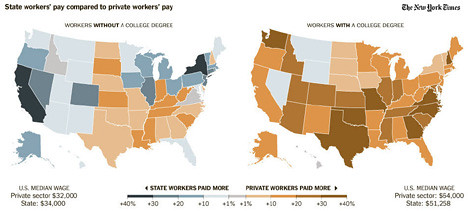Republicans have seen the future and it's in Mississippi.
On the same day Wisconsin Republicans turned to unprecedented and possibly illegal maneuvers to strip public workers of collective bargaining rights, the Michigan legislature blessed emergency powers for Governor Rick Snyder to terminate municipal contracts across the state. As Idaho joined Tennessee in seeking to curb teachers' unions, Ohio and other states pushed ahead with even tighter handcuffs on government employees. And while Republicans in Maine, Missouri and New Hampshire have introduced virtually identical legislation targeting private sector unions, back in Washington GOP Senators introduced a national "right-to-work" bill designed to make today's draconian red state restrictions on union organizing the law of the land tomorrow.
Sadly, the numbers show that incomes, working conditions, educational performance and health care are worst where union protections are weakest and Republicans poll best. And by almost any measure of social dysfunction, it is Mississippi - the most conservative state in the nation - where the GOP race to the bottom leads.
To make their case during the stand-off in Madison, conservatives took aim at Wisconsin's teachers. Unfortunately for their GOP echo chamber, the right-wing blogosphere made the mistake of complaining that Wisconsin received millions of dollars in federal education aid when solidly Republican red states get much, much more. Then, the would-be Republican union busters are whining that Badger state students can't read. As it turns out, Wisconsin students outperform their counterparts in those reddest of states where collective bargaining rights are few - or non-existent.
Like in Mississippi.
The education of its children provides just one of many heart-breaking stories of failure for the people of Mississippi. At $7,890 per student per year, Mississippi ranks 45th in school funding. (And even that meager figure is only made possible by substantial funding from the federal government.) According to the National Assessment of Educational Progress tests administered by the U.S. Department Education, only 22% of Magnolia State fourth graders read at or above grade level. By eighth grade, the figure falls to 19%. (Only the District of Columbia does worse.) It's no surprise that Mississippi has the lowest mean score on the ACT college admissions test taken by 96% of the state's high school graduates. And as it turns out, only 63% of its children even graduate, less than the national average of 69% (and much lower than the 81% in, for example, Wisconsin.)
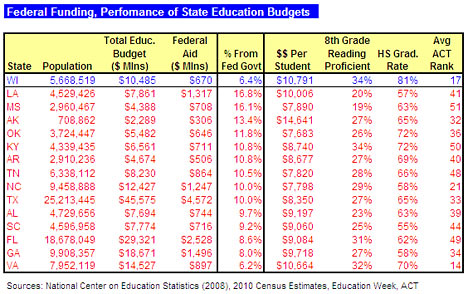
If the geography above looks familiar, it should. It not only resembles recent American electoral maps, but the atlas of union-busting as well. Within the borders of the so-called "Right to Work" states (which prohibit workers from being required to join a trade union as a condition of employment), private sector and public sector employees alike find unfriendly faces in power:
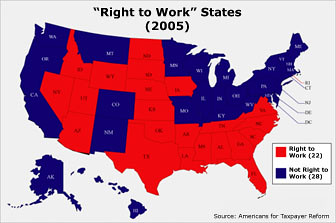
Just how unfriendly was documented five years ago by the Political Economy Research Institute at the University of Massachusetts. The report, titled "Decent Work in America: The State-by State Work Environment Index 2005", offers an assessment of the best work environments in the United States. The top five states were Delaware, New Hampshire, Minnesota, Vermont and Iowa, the bottom five were South Carolina, Utah, Arkansas Texas and Louisiana. (For the full data tables, analysis and methodology, see the report's technical background paper.)
As a rule of thumb, if your state voted for John McCain in 2008, workers there don't have it very good. All of the top 5 states voted for Barack for President; all 10 bottom dwellers are residents of George W. Bush's Red America.
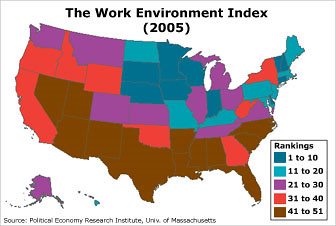
The Work Environment Index (WEI) rates the quality of Americans' working lives by a weighting of three factors: job opportunities, job quality, and job fairness. Job Opportunities includes the statewide unemployment rates, the duration of unemployment, and the percentage of "involuntary" part-timers. Job Quality refers to average wages (importantly, adjusted for the cost of living) and the proportion of workers receiving health and pension benefits. Job Fairness measures each state's percentage of low-wage workers (an indicator of income inequality), pay differential between men and women, minimum wage levels, collective bargaining rules and importantly, whether it is a "right to work" state.
There are no surprises among the worst performing states in the Work Environment Index. Virtually all below the Mason-Dixon Line, the WEI laggards feature dismal pay and an outwardly hostile environment towards union organizing, workers' rights and collective bargaining. Red America is the home of the Right-to-Work (RTW) states. A leader in the Right-to-Work movement, Bush's home state of Texas was ranked 50th, with the percentage of workers with health and pension benefits running a full 10% below the top WEI performers.
And compensation for state and local public employees is worst among the usual suspects. As the New York Times documented two weeks ago, state workers without a college degree generally make more than their private sector counterparts ($34,000 versus $32,000, or a 6.3% gap), while college graduates make much less (a -19.9% gap). But in the reddest of states, public employees experience a pay deficit regardless of education level. In Mississippi, the pay penalty for state workers without a college degree is 11.9%; for college graduates the deficit is 16.9%.
(Click here to see full size image.)
Since the WEI was published in 2005, the data on living standards in union-bashing Republican strongholds hasn't gotten any prettier. The Census Bureau's 2011 Statistical Abstract (which is based on 2008 data), shows per capita income and median household income is worst where GOP's laissez-faire crowd finds its strongest support. And if poverty is at its highest, as Speaker Boehner might say, then so be it.
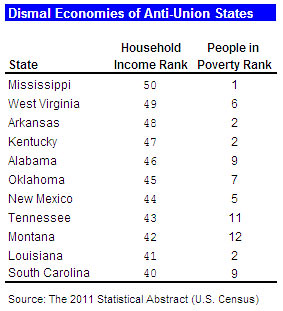
And so it is in Mississippi. Mississippi is one of the poorest states in the Union and has been for some time. According to the 2011 Statistical Abstract compiled by the U.S. Census Bureau, Mississippi ranks first in the number of people living below the poverty line. Unsurprisingly, its 50th ranking median household income of $37,790 is the lowest in America, and over $14,000 below the national figure. Per capita income is similarly dismal. It's with good reason that in 2007, Mississippi ranked fourth in per capital federal aid.
And first, it turns out, in the percentage (76%) of its state Medicaid program paid for by federal matching funds. That didn't stop Mississippi Governor and GOP White House hopeful Haley Barbour from calling last week for the conversion of Medicaid into block grants for the states to control. To make his case, Governor Barbour updated Ronald Reagan's old myth of the "welfare queen":
"We have people pull up at the pharmacy window in a BMW and say they can't afford their co-payment."
That whopper didn't merely earn a "Four Pinocchio" rating from the Washington Post. It also obscured the fact that Haley Barbour's Mississippi is already home to perhaps the least generous Medicaid program in the nation:
Mississippi provides some of the lowest Medicaid benefits to working adults in the nation. A parent who isn't working can qualify only if annual family income is less than 24 percent of the poverty line. Working parents qualify only if they make no more than 44 percent of the federal poverty level. Seniors and people with disabilities are eligible with income at 80 percent of the poverty line...
Translated from the federal poverty guidelines, that means a working Mississippi couple with one child could earn no more than $8,150 a year and still qualify for Medicaid, seniors and people with disabilities could earn no more than $8,700, and a pregnant woman could earn no more than $20,000 a year.
But those numbers don't begin to capture the failure of the Mississippi health care system. In its 2009 state scorecard, the Commonwealth Fund ranked Mississippi dead last in its assessment of health care access, prevention, equity, affordability and lifestyles. In December, the "America's Health Rankings" project also put Mississippi at 50th among the states. And in 2009, another UnitedHealth Group funded study concluded that Haley Barbour's home state had the unhealthiest residents in America.
And nationwide, health care is worst where Republicans poll best.
About a year ago, the Commonwealth Fund released its 2009 state health care scorecard. There, too, Mississippi led the Republican south -and the entire country - in providing dismal health care. Again, while nine of the top 10 performing states voted for Barack Obama in 2008, four of the bottom five (including Arkansas, Mississippi, Oklahoma and Louisiana) and 14 of the last 20 backed John McCain. (That at least is an improvement from the 2007 data, in which all 10 cellar dwellers had voted for George W. Bush three years earlier.)
It is sadly ironic that, for the most part, the states suing to prevent the implementation of the Affordable Care Act are the ones whose residents need it most. Among the leaders of that Republican effort? Mississippi.
Sadly, Mississippi and many of its fellow red states also lead America across a host of other social pathologies. Using data from the Census Bureau and the Legal Community Against Violence's state-by-state comparison of firearm laws, the Daily Beast in January concluded Mississippi was the deadliest gun state in the nation. Its divorce rate is among America's highest; the teen birth rate is at the very top.
Even sadder for the United States as a whole, we already know how the new Republican race to the bottom ends. Where unions are smashed, government workers vilified, taxes low, public services under-funded and only guns are plentiful, the prospects for quality education, health care and economic futures are few. Welcome to the Republican vision for America.
It's called Mississippi.
UPDATE: Almost on cue, White House hopeful Haley Barbour attacked President Obama's handling of the economy, claiming his own state serves as a shining example. ""We still have more to do in Mississippi," Barbour said, adding, "But we have made great progress and are laying a foundation for the future."
(An earlier version of this piece appeared at Perrspectives.)







